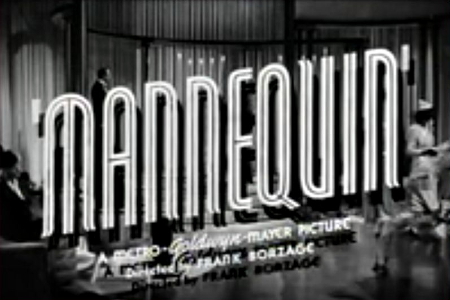
The Best of Everything
Encyclopedia Entry • Films Main
Mannequin
1938

Critics' Reviews • Our Reviews • Movie Posters • Lobby Cards • Misc. Images
Click here to see photos from the film.
US general release: 1/21/38.
VHS release: 6/24/92. Warner Archive DVD release: 3/23/09. Cast: Joan Crawford (as "Jessica Cassidy"), Spencer Tracy, Alan Curtis, Ralph Morgan, Mary Phillips, Oscar O'Shea, Elizabeth Risdon, Leo Gorcey. Credits: Developed from an unpublished story by Katharine Brush. Screenplay: Lawrence Hazard. Producer: Joseph L. Mankiewicz. Director: Frank Borzage. Camera: George Folsey. Costumes: Adrian. Editor: Frederic Y. Smith.
Plot Summary: Mannequin stars Joan Crawford as Jessie Cassidy, a girl of the tenements (though this being an MGM film, her slum dwellings are cleaner and more lavish than most middle-class bungalows!) Hoping to escape her grimy surroundings, Jessie marries Eddie Miller (Alan Curtis), a childhood acquaintance who has made good with a variety of dishonest business ventures. Another refugee from Jessie's neighborhood is John Hennessy (Spencer Tracy), who has likewise worked his way up to fame and fortune, albeit more honestly than Eddie. Faced with mounting debts, Eddie callously orders Jessie to divorce him and marry John for his money -- then divorce John and return to Eddie with the cash. Jessie reluctantly goes along with the scheme, but she double-crosses Eddie upon falling in love with John. Things look bad for our heroine when Eddie, with blackmail on his mind, threatens to spill the beans to John about their little "arrangement" -- whereupon John solves the dilemma (and saves his marriage) by losing his own fortune. ~ Hal Erickson, All Movie Guide
Awards: 1939 Oscar nomination for Best Music, Original Song: "Always and Always." (Music by Edward Ward; lyrics by Chet Forrest and Bob Wright. Sung by Joan.)
Notes: In production from 9/7/37 to 10/25/37. The only onscreen teaming of Crawford and Tracy; the pair also had a fling during filming.
|
Frank Nugent in the New York Times (1938): A glib, implausible, and smartly gowned little drama, as typically Metro-Goldwyn-Mayer as Leo himself, Mannequin...restores Miss Joan Crawford to her throne as queen of the working girls....Miss Crawford, let it be said, meets these several dramatic emergencies in her best manner, which, as you know, is tender, strong, heroic, and regal. For a Hester Street alumnus, she has a Park Avenue way about her, not to mention perfect diction and a curious remoteness from the odor of frankfurters and sauerkraut.... We thought at times that the script writers had the roles reversed, that Mr. Tracy should have been the honest working boy, Miss Crawford the plutocrat....
Howard Barnes in the New York Herald Tribune (1938): Joan Crawford is not particularly happy in the role of the slum princess. Try as she may, she is too tony for Hester Street and too much Miss Crawford for the poor girl who made good.
D. Cairns at wordpress.com (2008): We were so impressed by this film, which despite being from MGM (the Vatican of poshlust), had a genuine Warner Bros grit. Despite the title, Joan C is a fashion model for about five minutes, long enough to cram a parade of “gowns by Adrian” into the proceedings, but mostly she’s struggling to escape the slums, vividly embodied by her family and her no-goodnik boyfriend. I liked Leo Gorcey’s casting here as the kid brother: the unacceptable face of poverty, he’s possibly the vilest character in any Borzage film, although the boyfriend is only superficially better (I also liked that the bf manages a fighter called Swing Magoo). Best of all, Joan Crawford and Spencer Tracy are just amazing here, empathic and charming and sincere in ways we tend not to find them. Two actors we often don’t admire, giving wholly admirable performances: proof of Borzage’s superior talent, as far as we’re concerned. The fact that Borzage was apparently screwing Crawford maybe helped, I don’t know. Maybe Tracy is mirroring Borzage’s own feelings. At any rate, Tracy’s adoration of his co-star is palpable. |
If you've seen Mannequin and would like to share your review here, please e-mail me. Include a photo of yourself or avatar to accompany your review, a star-rating (with 5 stars the best), and any of your favorite lines from the film.
Rating:
As Joan hit her own mid-30s in the mid-1930s, MGM clearly didn't quite know what to do with her. 1936 saw a big hit with the formulaic romantic comedy Love on the Run (co-starring Gable for the seventh time and husband Tone for the sixth) but only a minor money-maker with the historical The Gorgeous Hussy. 1937's society European drama The Last of Mrs. Cheyney (co-starring William Powell) was a solid hit, but the rags-to-brief-riches European drama The Bride Wore Red (co-starring the minor actors Tone and Robert Young) was Joan's first box-office flop since 1933's Today, We Live.
With Mannequin, the studio tried a little bit of everything that had brought Joan success only a few years ago. It's kind of a combination of 1931's Possessed and 1934's Sadie McKee---A poor girl (although Joan at 30-something is no longer a "girl") tries to escape her lowly roots via meeting a rich man. In Possessed, the ultimately-true-love rich man in question (Gable) is a well-intentioned politician and the boyfriend-back-home merely crude, though a hard worker. In Sadie, the rich man is a kindly lush and the true-love boyfriend (Gene Raymond) a weak-willed low-life (she ends up with neither). In Mannequin, the ultimately-true-love rich man (Spencer Tracy) is a well-intentioned shipping magnate and the once-true-love husband (Alan Curtis) an intentionally scamming low-life.
The biggest difference in Mannequin, though, is the little bit of new-found realism that MGM throws in: In Possessed, for instance, Joan's character just wanted to leave home because she was bored with her life. In Mannequin, her character Jessie is trapped in a baby-squallingly loud tenement with a deadbeat, unemployed dad and brother (played with enjoyable obnoxiousness by Leo Gorcey of the Dead End Kids) who demand servitude from Jessie and her mother. Jessie begs her boyfriend Eddie (Alan Curtis) to marry her and take her away from her squalid family life, not knowing that life with Eddie will be no better at all... AND that he'll be subsequently pimping her out to the richest man in town!
Alan Curtis is perfectly cocky as the good-looking, pimping Eddie who can't ever get a real job. He subsists on gambling, "managing" fighters, blackmailing his own wife then accusing her of asking too much of him, etc. And Joan's Jessie is equally good at being dreamily in love with him, at least in the beginning. She's a "ride or die" sort, always making excuses for his shortcomings. Up to a point.
Spencer Tracy's "John Hennessey" is the town's rich shipping magnate (beloved among his non-Union workers, though ultimately betrayed by them) that Eddie wants Jessie to seduce. Eddie's pimping starts on the eve of his own wedding celebration, when he insists on his new bride dancing with the powerful man. Hennessey actually falls in love with Jessie at first sight, leading to a few very mild plot twists re who Jessie actually loves.
Joan and Tracy, in their only film appearance together, are warm and natural onscreen together. One particularly cute scene is on a plane during their honeymoon: Jessie tears up sentimentally and buries her face in his shoulder; Hennessey then proceeds to rub her roughly on the top of her head until she starts to laugh---seems like a spontaneous moment for the two, who were having an affair at the time. (Another cute scene, earlier, is when Hennessey goes to see Jessie at her new modelling job at a department store: Every time she passes his table, he asks her out: breakfast, lunch, tea... By the time he gets to "dinner," she finally laughingly cracks up after saying "No!")
Weak points of the film: Joan's Jessie goes from factory worker to chorus girl to fashionable department-store model ("mannequin") very quickly, and all behind-the-scenes! Eddie apparently got her the chorus girl job because he wanted more money brought in, and she apparently got herself the department-store job after breaking up with Eddie. Joan's accent wavers quite often from "street" to "proper lady." Ideally, you'd think that she'd be "street" with Eddie and her family, and maybe "street" with Hennessey when she wasn't trying to impress him at the beginning. But there's no rhyme or reason.
A strong point of the film: The turning point of the film, between Jessie's blindly following the sleazy Eddie and her choosing her own destiny, comes about halfway through the film, when Jessie and Eddie are back visiting her crummy family tenement apartment, and Jessie and her mother are again in the kitchen (the heat from the potato kettle illuminating Jessie's face), while deadbeat dad, brother, and Eddie are literally lying around the living room kvetching about their hard luck in life. At this point, her longtime down-trodden mother (after reminiscing about her own past dreams) says to Jessie: You've got a strength of your own. You can do things...Remember what it was you hated. Always remember what it is YOU want. Get it. Any way you can."
The character of Jessie really takes off from here, dumping the sleazy Eddie and allowing the much-nicer Hennessey to pursue her... (Also included is a brief cinematic nod to the real-life Marion Davies selling her jewels to help lover Hearst out of his financial dilemma.)
Overall, it's a pretty good film. Simplistic, plot-wise, but with very good individual performances by Joan, Tracy, and Curtis, as well as from character actors Mary Phillips (as the wise-cracking, truth-telling Beryl, a fore-runner to Eve Arden characters) and Leo Gorcey.
Rating:
TCM
recently had a Frank Borzage mini-marathon. Of interest to me were
movies JC did with the director: The Shining Hour (1938, which I had not seen
before), Strange Cargo (1940, which I love and have reviewed for this
site), and the subject of this monologue, Mannequin (1938). (I wish TCM
had run the table and included the fourth Borzage-directed film of JC’s: The Circle [1925].)
Joan plays Jessica “Jessie” Cassidy, a working-class girl determined to make good. (Hmm. Where have I heard that one before?) Every Joan flick from this era needs a love triangle, and the other two vertices of this amorous isosceles are her boyfriend and fellow Lower Eastsider, Eddie Miller (Alan Curtis), and former Hester Street denizen made good, shipping magnate John Hennessy (Spencer Tracy). Mannequin
is most notable as the only screen pairing of Hollywood Titans Joan
and Tracy, and Joan
performs very well. (Mannequin is sandwiched between Tracy's
Oscar-winning turns in Captains Courageous and Boys Town, so you know
that JC wanted to be at her best in such rarefied company.) Few early-1930s Joan histrionics are on display
here, despite opportunities for such. She
gives a good and measured performance as a woman torn
between lovers, as well as conflicted by duty to her family, especially her mom,
and a desire
to get out of the ghetto.
While early-'30s Joan is typified by the desire to make good through gumption and hard work with a pinch of sexiness, Jessie seems more determined to escape the tenements via marriage to boyfriend Eddie, a real crumb. His portrayal by Alan Curtis is all louse, all the time. He's the kind of person who is convinced that only he knows how the world really works, and the rest of us are saps for trying to play the game by the rules. On several occasions I wanted someone to slap this mug around. So I guess that qualifies as a successful performance by Curtis. Another minor actor of note is Leo Gorcey, as Joan's younger brother, who was just beginning his career as a Dead End Kid/East Side Kid/Bowery Boy. He's a punk with a wise mouth, but he has Eddie and his own Pa pegged for what they are, lazy bums, and gets to fire off a few good lines in the process. Speaking of good lines, the best line in the film goes to Mary Philips---Bogie’s recent ex-wife---as Beryl, Jessie’s moxie-laden gal pal: Jessie: Eddie Miller took me away from Hester Street. Can't you understand that? The
gem of the supporting cast, however, is Elizabeth Risdon, as Jessie's
long-suffering Ma. Risdon was a consummate pro who began acting in films when
young Lucille LeSueur was still traipsing around Lawton, OK. Her performance
as a woman beaten down by a lifetime of supporting a deadbeat husband---and desperate to not have her daughter make the same mistake---is subtle
and powerful. I think if they had given Risdon more lines, she could
have been nominated for a Best Supporting Actress Oscar, and it would
have improved the picture a good bit.
Fun facts: * Joan's brother Hal has a bit part in Mannequin. Other bit players include future husband Philip Terry and frequent JC co-castmate Gwen Lee. (Their parts must be microscopic; I can't recall any of them.) * Mannequin earned a Best Original Song Oscar nomination for “Always and Always," which is sung by Joan. * Joan gets top billing over Tracy. (Oh well, if The King couldn’t wrest top billing from Joanie in Cargo after Gone with the Wind...) * The film turned a healthy profit. This was a short while before Joan became “box office poison” in the famous diatribe from the Independent Theater Owners Association. You can read the full text here. https://en.wikipedia.org/wiki/Box_Office_Poison_(magazine_article). (Really? Guff to two of my favorite Golden Age ladies, Joan and Kay Francis? Tacky!)
In
short: The movie is an hour-and-a-half of light
entertainment and escapism. Joan looks good in gowns by Adrian, many of
which she wears during a short fashion sequence that includes amusing
repartee between Crawford and Tracy. As mentioned above, her acting is
nicely done here. One can easily see Joan working on becoming accepted
as a serious actress, holding her own against an actor of Spencer
Tracy's magnitude.
Rating:
In a 1970 appearance on the David Frost Show, Joan was asked about her favorite leading men. She naturally mentioned Clark Gable ("the King") as her favorite, first and foremost, but then ponders a second and says next, "Spencer Tracy," her co-star (for the only time) in Mannequin. In later private candid interviews, however, she speaks more harshly and truthfully, calling Tracy an "unmitigated son-of-a-bitch." Wow! Rumor has it she begged off from appearing in another movie with Tracy, though I feel they play well together and should have been co-starred again with a better story.
I am happy that this film was made (thank you, Producer Mankiewicz) because the chemistry with Tracy is unique. Some critics have written that Miss Crawford gave one of her best performances. I can understand their opinion because I think she and Tracy triumph together, even if the script is simplistic.
Miss Crawford is strong and forthright from the very first glimpse. She is tired, sweaty, and a hard-working gal. Her character is similar to “Sadie McKee” and a few others, but here Miss Crawford’s Jessica is not as safe or secure as Sadie. Jessie is loved but lives in an unstable home, with equally unstable work life and future. The setting she lives in---New York City's Hester Street---is poor, crowded, dirty, and hopeless; only the lucky ones even think about getting out.
Jessie’s parents, played by veteran actors Elizabeth Risdon (Theodora Goes Wild) and Oscar O’Shea (The Shining Hour), are well cast and realistically acted. Leo Gorcey (Dead End) as Miss Crawford’s younger brother completes the family; he is as real as my own brother---still hitting the folks up for coin, and no care for the future. (Run Jessie, run!) Miss Crawford has a wonderful scene with Miss Risdon that is heartfelt and poignant and very touching, all the while berating the dad and his peeled potatoes. I can identify; growing up, men on my block were like that with their women: Keep her in the kitchen! Jessie’s mom is the key that opens her life and the script.
After the “dogs in the hay” are served, Jessie’s friends show up; they are a hip lot. Mary Philips (she is the Glenda Farrell of MGM, and also the former Mrs. Humphrey Bogart) is Jessie's street-smart, sassy, and sharp best friend. She has the best lines in the movie!
Alan Curtis (Phantom Lady) appears on the screen for the very first time. He must have based his character, Eddie, on guys from my neighborhood on the south side of Chicago. They charm you like a politician and you like them, even though you know they are taking you, or will eventually. Jessie always loved Eddie---he gets her out of Hester Street when she can no longer take her surroundings. (Later her best friend says, “A streetcar could have done that---and cost you less.”)
Miss Crawford convinces you of her naivete and youthful dreams with skillful acting and meaning. She is believable and pretty to look at throughout. She and Curtis make a sexy, handsome couple. At their wedding dinner, which is held at a Chinese restaurant that serves gefilte fish (hold the soy sauce!), Tracy and his unflappable colleague Ralph Morgan (brother of Frank) enjoy the place, too. Between courses, Tracy sees the happy party and decides to send over a bottle of champagne, and the Joan Crawford Triangle we love begins.
Things happen fast. The moment Industrious Tracy and Miss Crawford see each other, there is a spark of attraction; both are internally intrigued with each other, portraying a subtlety in their emotional link while trying to suppress it. Later, Miss Crawford impresses Tracy with a dance forced on her by her lousy soon-to-be ex-husband (the first real indication that Eddie is a loser). Later, when she sings “Always,” Tracy falls in love completely. Miss Crawford is really very good, and her voice and body are appealing. The cameraman also does a splendid job in this scene.
The Oscar-winning director Frank Borzage (Sunrise, Seventh Heaven) also directed Strange Cargo. Here, he gives attention to the beauty of Miss Crawford and her growth as an actress. He makes the story work, despite the implausibility of the script. Miss Crawford goes from sweaty, tired factory girl to wedded bliss; a job in the chorus, then heartbreak and harsh reality; and then happiness again and a new happy tycoon marriage; then disaster, blackmail, union-busting, and more heartbreak and sacrifice. Everything will be alright, though. Borzage, Mr. Mayer, and the writers make sure of that.
An afterthought about the film title: One of the early choices was Three Rooms in Heaven. (Oh brother! Why not call it Hester Street? Or The Hood? Or maybe Not the Girl Next Door! But Mannequin?) Miss Crawford is beautiful as a model for a fashion showroom, but the scene lasts 4 minutes---certainly not enough to title the whole thing Mannequin!
Susanne (August 2009) Rating:
I really like this film, not because it´s such a substantial one but because it´s a wonderful example of inferior material sublimated by a strong cast and fine directing. Joan gives a powerful performance -- unfortunately underestimated by herself -- which turns "out-of-a-fairy-tale" Jessie into a wholebodied character. One of Joan´s fortitudes as an actress was to intertwine strength and vulnerabilty, an ability which changes Jessie´s naive "sticking to her man" into an impressive example of staunchness and endurance. Her "holding on" is likeable because with this layer of strength, under it you know all the time that she is capable of "doing good" on her own, something she proves later on in the film. Some scenes are very touching, for instance when she and her husband wait for the train together after she got him out of prison and Jessie tries to reach out for him, to remind him that they still have each other...Joan plays this whole scene at the edge of tears -- very intense! Played by an inferior actress Jessie would be a rather annoying, boring person. Another thing I like about this film is her teaming with Tracy; they come across very naturally and there are moments which make an almost improvised impression. The title "Mannequin" is misleading -- the "Mannequin sequence" takes only about five minutes. And don´t expect a plush MGM vehicle: an important part of the movie takes place on murky Hester Street.
|
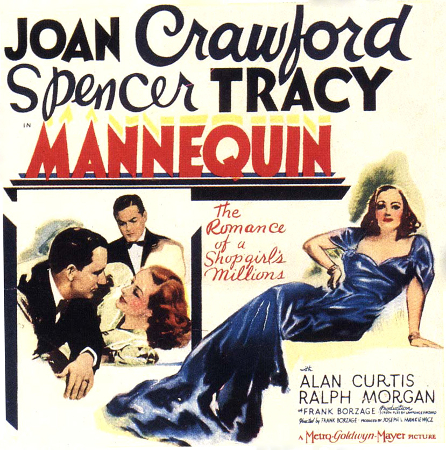
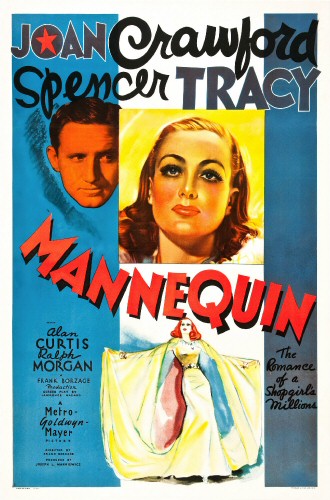
Above: US posters. Below: Left two posters from France; right from Belgium.
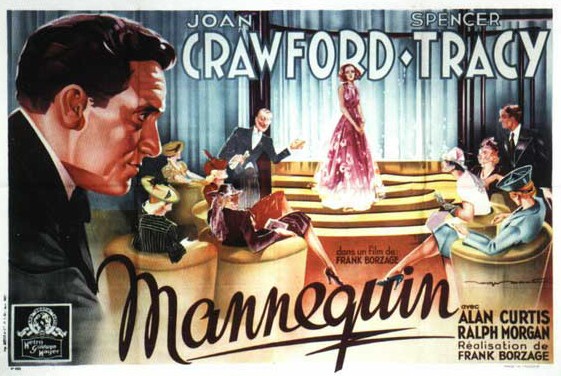
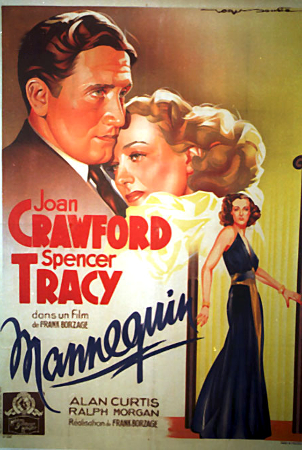
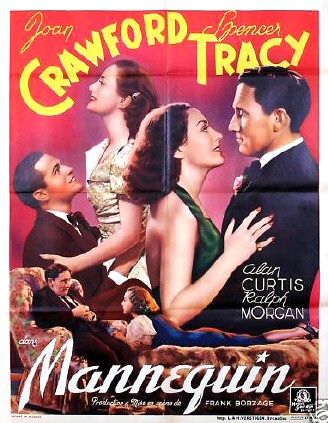
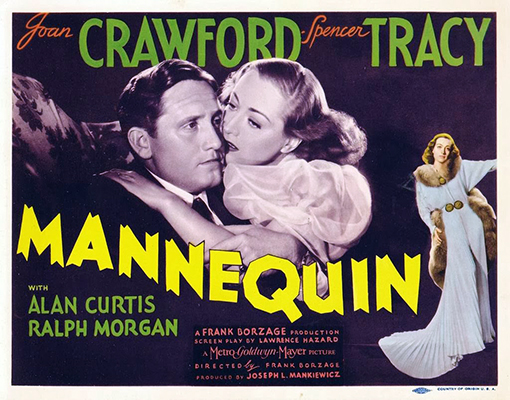
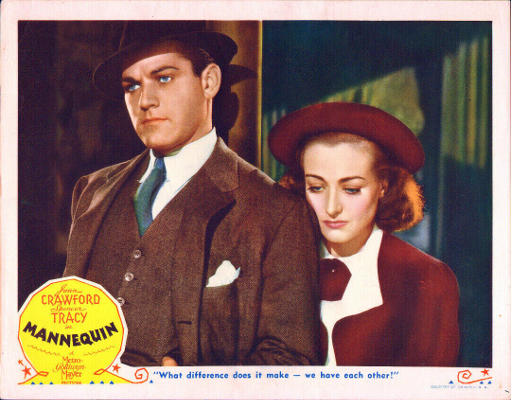
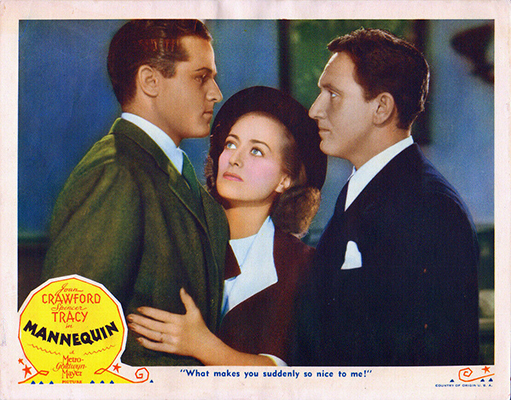
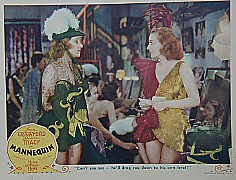

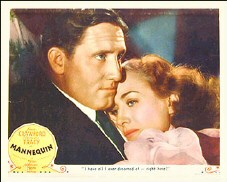
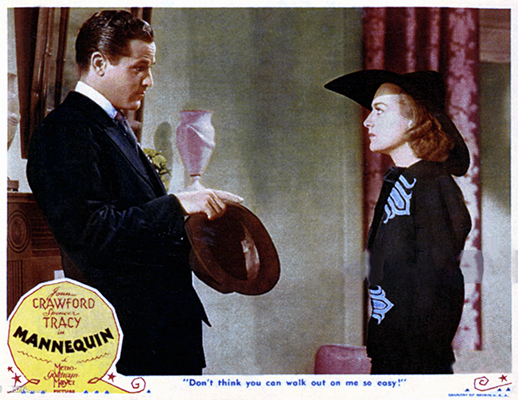
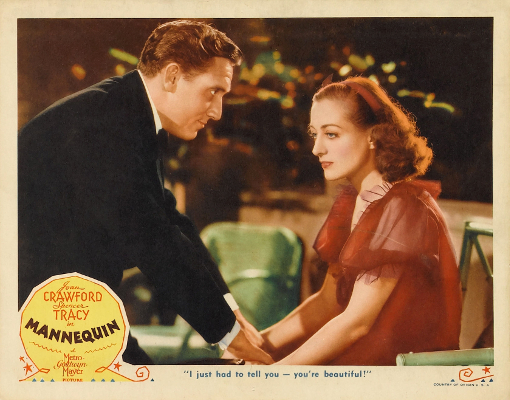
Above: US lobby cards.
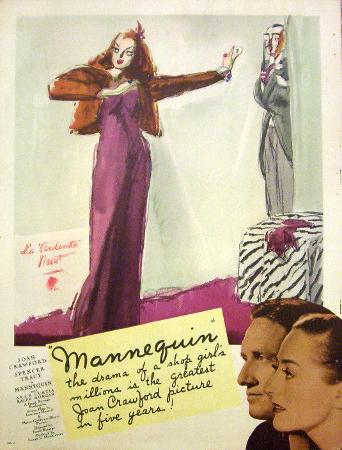


Above:
US promo handout, US trade ad, and Canadian glass slide.
Below:
US flyer cover and centerfold.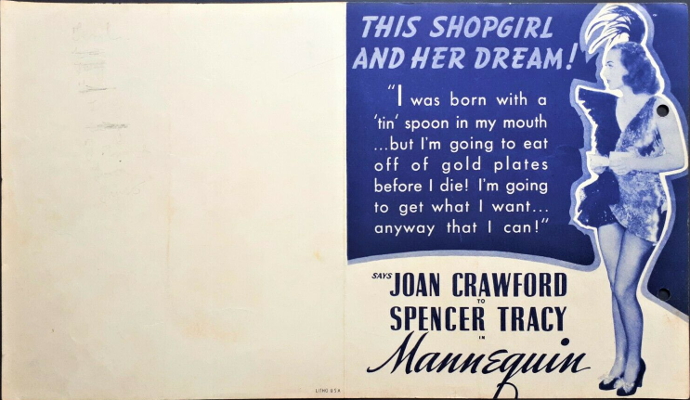

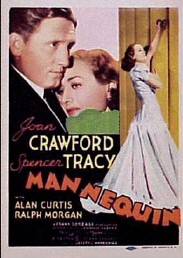
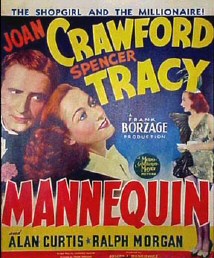
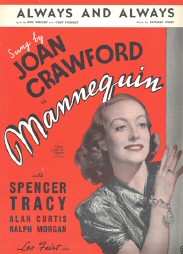
Above left: Two window cards. Above right: US sheet music.
Below: Newspaper ads from Toronto (left) and the US.
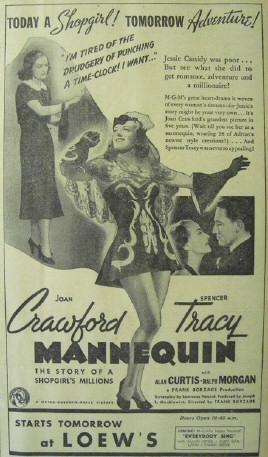
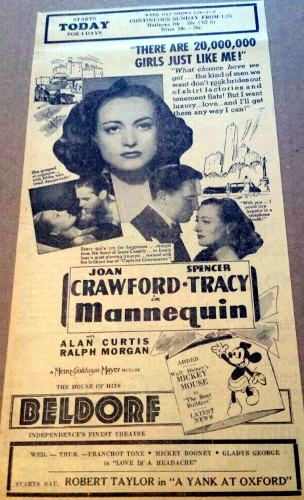
The Best of Everything